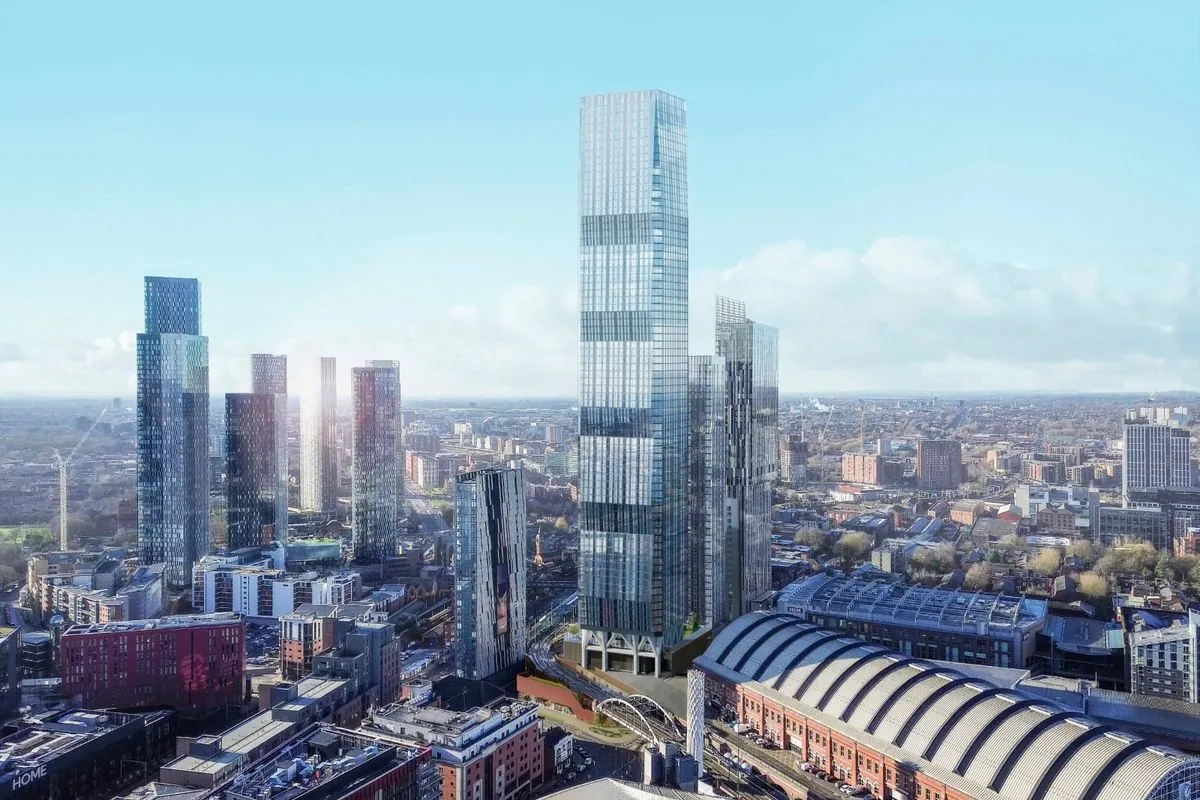Manchester Approves Record-Breaking Skyscraper Amid Funding Controversy
Manchester City Council greenlights plans for the city's tallest skyscraper and four other high-rises, sparking debate over public funding and affordable housing. The projects face scrutiny amid legal challenges and market distortion concerns.

Manchester, a city renowned for its industrial heritage and cultural significance, is set to transform its skyline with the approval of several ambitious high-rise projects. The Manchester City Council recently gave the green light to plans for the city's tallest skyscraper, along with four other towering structures, all developed by housing company Renaker.
The centerpiece of this development is a £300 million, 71-storey tower in Deansgate, which will house 642 apartments, a swimming pool, sauna, and a top-floor restaurant. This project, along with four neighboring residential buildings reaching up to 51 storeys, will collectively add 2,388 new homes to the city's housing stock.

While these developments promise to reshape Manchester's urban landscape, they have sparked controversy due to their funding sources and lack of affordable housing. The Greater Manchester Combined Authority (GMCA), led by Mayor Andy Burnham, has provided substantial financial backing to Renaker's projects through its housing investment loans fund.
This public funding has come under scrutiny, with rival developer Weis Group filing a High Court claim alleging unfair lending practices. The GMCA has loaned over £500 million to Renaker and its associated companies, raising questions about market distortion and preferential treatment.
The approval process for these projects has not been without opposition. Despite 69 objections filed against the developments, no objectors attended the council meeting to voice their concerns. This lack of representation at the crucial decision-making stage has raised eyebrows among observers.
A significant point of contention is the absence of affordable housing in these new developments. Manchester has a city-wide target of 20% affordable housing in new projects, yet Renaker claimed that including such units would render the skyscrapers financially unviable. The council has stated that the developer's ability to provide affordable housing will be reassessed once the majority of the projects are completed and occupied.
These developments come at a time when Manchester is experiencing rapid growth and urban renewal. The city, which played a central role in the Industrial Revolution, has been reinventing itself as a modern metropolis. It has been ranked as the best UK city to live in for three consecutive years (as of 2021) and boasts the third-largest urban economy in the United Kingdom.
As Manchester continues to evolve, balancing progress with social responsibility remains a challenge. The city's symbol, the worker bee, represents its industrious past, but now it must also symbolize a commitment to inclusive growth and sustainable development.
"The developer's ability to provide affordable housing will be re-tested once the majority of the projects have been completed and occupied."
While Renaker's projects dominate the current discourse, other developers are also leaving their mark on Manchester's skyline. Plans for a 34-storey tower in Piccadilly, which aims to be the UK's first net-zero tower, have also been approved. This project, featuring an aparthotel and a "net zero lifestyle" museum, showcases the city's ambition to blend architectural innovation with environmental consciousness.
As Manchester prepares for this vertical expansion, it's worth noting that the city's transformation extends beyond its physical appearance. Home to two Premier League football clubs, world-class universities, and a rich cultural scene, Manchester continues to attract global attention and investment.
The approval of these skyscrapers marks a significant milestone in Manchester's urban development. However, it also underscores the need for careful consideration of public funding allocation, affordable housing provision, and sustainable growth strategies. As the city reaches new heights, literally and figuratively, the challenge lies in ensuring that this progress benefits all of Manchester's residents and maintains the city's unique character and heritage.


































